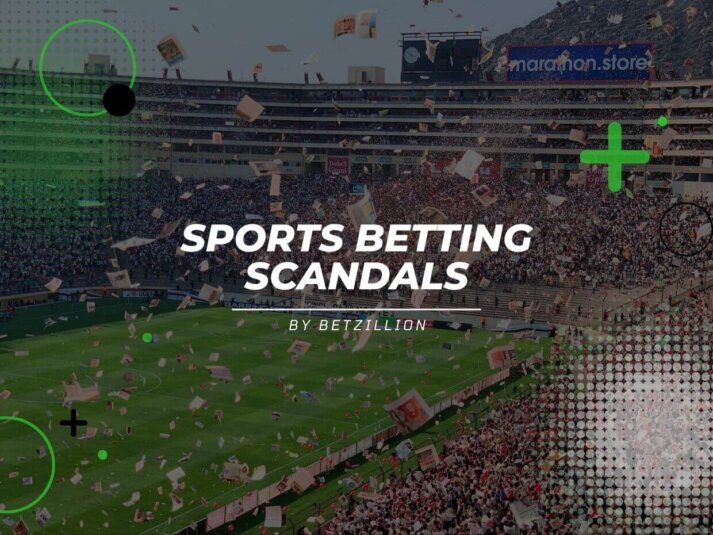Sports Betting Scandals

Ever since the advent of sports betting, gamblers have attempted to influence the outcome of games to gain an edge with their bets. It has led to some of the biggest sports betting scandals in history. Despite all the rules and guidelines sportsbooks and authorities have put in place to prevent it, game rigging remains a major concern in sports betting. And the scandals continue till today.
This article explores some of these incidents, from the most famous in history to the most recent sports betting scandals.
We will talk about the following:
- Black Sox scandal (1919)
- NCAA basketball scandal (1961)
- The Tim Donaghy scandal (2007)
- NFL players busted betting (2019-2022)
Examples of Biggest Sports Betting Scandals
As mentioned, punters always seek to gain an edge over bookmakers to maximize their chances of winning. It can lead to drastic actions taken too far, like bribing players, referees, coaches, and other people involved in sporting events. And sometimes, these sports personnel are influenced and take actions that affect the game’s outcome to favor the bets placed. There are incidences where the sports personnel are the ones that personally engage in game fixing for favorable bets.
While several sports betting scandals have tainted the sacred integrity of sports over the years, certain ones are more renowned. Let’s get into some of the biggest sports betting scandals.
Black Sox Scandal (1919)
Even after 100 years, the Black Sox Scandal remains one of the biggest betting scandals in sports. It was so far-reaching in what it meant for sports that a movie was made about it.
This Major League Baseball (MLB) game-fixing scandal revolved around the Chicago White Sox facing the Cincinnati Red during the 1919 World Series. Eight members of the Chicago White Sox were accused of throwing the World Series in exchange for money. It included star players “Shoeless” Joe Jackson and Eddie Cicotte, alongside Arnold “Chick” Gandil, Oscar “Happy” Felsch, Fred McMullin, Charles “Swede” Risberg, George “Buck” Weaver, and Claude “Lefty” Williams.
Before the incident, the Chicago White Sox headed into the World Series as the heavy favorite. It created the perfect situation that Arnold Rothstein, the notorious gambler who paid the bribes, needed to trigger one of the most famous sports betting scandals.
When the incident occurred, authorities launched a grand jury investigation in 1920, indicting the eight players alongside five gamblers. In 1921, a jury acquitted all eight players of the charge, but there was no doubt that members of the White Sox took money to influence the outcome of the World Series. So, despite the acquittal, the newly appointed baseball commissioner at the time, Judge Kenesaw Mountain Landis, decided to place a lifetime ban on all eight players from professional baseball.
The impact of this incident led to major reforms within baseball that would ensure the integrity of the game.
CCNY Point Shaving (1950-1951)
The CCNY point-shaving scandal is one of the most significant gambling scandals in sports. The scandal involved the City College of New York (CCNY) basketball team, the only team to win the NCAA Tournament and NIT in one season in 1949-50. The team was later found to be front and center of a college point-shaving gambling scheme along with six other American schools, involving 33 players in all as well as organized crime.
The scandal first came to light after New York District Attorney Frank Hogan arrested seven men suspected of conspiring to fix games in February 1951. Among these seven men were three stars of CCNY’s five, including Ed Warner, Ed Roman, and Al Roth. Hogan’s investigations led to the arrest of 32 players from all seven colleges involved, who admitted to participating in game fixing for money between 1947 and 1950.
NCAA Basketball Scandal (1961)
About a decade after the CCNY incident, the NCAA basketball scandal was another major scandal on bet that rocked the college sports world.
This time, the scandal involved 37 students across 22 colleges, including well-known programs like UNC, St. John’s University, University of Dayton, NYU, North Carolina State, and the University of Connecticut. Gamblers were bribing players in the NCAA to intentionally miss shots, commit turnovers, and perform actions that would ultimately impact the outcome to favor certain bets.
The scandal unraveled when Aaron Wagman, one of the gamblers involved, turned informant and provided evidence on the scheme to federal authorities. His tip led to several investigations that exposed the scheme, resulting in legal actions against players, coaches, and gamblers.
Boston College Point Shaving (1978)
The Boston College point-shaving scheme of 1978 ranks among the most infamous sports gambling scandals ever. The scandal involved players of the Boston College Eagles working alongside members of the American Mafia to influence point spreads for favorable bets.
The scheme started when Rocco Perla and his brother Anthony, two small-time gamblers, approached Rick Kuhn, Rocco’s high school friend and a budding key member of the 1978-79 Eagles team. The proposed scheme involved Kuhn being responsible for ensuring that by his play, Boston College does not meet the point spreads.
The Perla brothers involved a betting syndicate in maximizing their potential gain, with Paul Mazzei, Henry Hill, and James Burke getting in on the action. Over time, the Perla brothers and their associates recruited additional Eagle players to enhance their control over the outcomes.
The scheme unraveled and came to light in 1980 when Henry Hill turned state’s evidence to avoid jail time after his arrest for drug trafficking charges. After a four-week trial, each conspirator was convicted on charges and sentenced to prison. Kuhn, who was at the center of the arrangement, also got a ten years prison sentence, later reduced to 28 months.
Recent Sports Betting Scandals
One surprising thing about betting scandals in sports is that despite the heavy consequences involved, many players, coaches, referees, and others are still engaging in game-fixing. So, even today, sports betting scandals continue to surface, reminding us of the constant challenge of sports integrity.
Now, look at some recent sports betting scandals after the 1990s.
The Tim Donaghy Scandal (2007)
The Tim Donaghy scandal that unfolded in 2007 shook the world of the National Basketball Association (NBA) to its core, resulting in one of the most notable US sports betting scandals.
Tim Donaghy is a former professional basketball referee in the NBA for over a decade between 1994 and 2007. After officiating hundreds of games in over 13 NBA seasons, Tim Donaghy’s career ended when the Federal Bureau of Investigation (FBI) investigated his involvement in game-fixing.
The investigation revealed that Donaghy, who had a gambling problem, had been placing bets on NBA games with independent online bookmakers based on inside information he had access to. It was also revealed that he was illegally betting on the games he officiated, raising whether he tailored his calls to favor bets. Investigations also revealed that Donaghy had been disclosing insider information to an acquaintance and receiving $5,000 on every correct pick.
Once the bet scandals came to light, Donaghy pleaded guilty to two felony charges of conspiracy in 2007. One charge of conspiracy to commit wire fraud, and the other was a conspiracy to transmit gambling information. In 2008, the court sentenced him to 15 months in federal prison and three years of supervised release.
This incident was a wake-up call for the NBA, prompting stricter rules and regulations to safeguard the sport’s integrity and prevent repetition.
A Trio of NCAAB Scandals (the 2010s)
The 2010s witnessed a trio of significant sports gambling scandals that rocked the world of NCAAB college basketball. These incidents involved three schools and occurred in the decade’s first half.
In 2011, the University of San Diego was found to have fallen prey to a point-shaving scheme. Former Torero guard Brandon Johnson was at the heart of the FBI investigations into the scheme. Johnson was among the ten individuals charged with conspiracy to control the outcomes of basketball games. Interestingly, the FBI only learned about the scheme during an unrelated investigation into a group selling weed and running illegal casinos. Johnson pled guilty to the conspiracy and got a six months sentence in federal prison.
In 2012, Kyvievarez Ward was indicted on two counts for participating in a point-shaving scheme while playing with the Auburn Tigers basketball program. Investigations found that the point guard conspired with others to influence sporting events during the 2011-12 season.
In 2014, 3 basketball players at the University of Texas at El Paso (UTEP) basketball players were kicked off the team for gambling on athletic events. While the investigation found no obvious proof of point shaving, the FBI found that the three seniors, McKenzie Moore, Justin Crosgile, and Jalen Ragland, had bet on sporting events. There was also no indication that the UTEP seniors bet on their games. This action ended their college basketball career, and they were expelled.
NFL Players Busted Betting (2019-2022)
The NFL is also not left out of the biggest betting scandals in sports, as it has recorded several incidents.
A notable scandal on bets was when Josh Shaw
, Cardinals cornerback, placed bets on NFL games in 2019 while he was on an injury reserve in Las Vegas. Authorities launched investigations into the allegations after the incident came to the NFL’s attention. They found that he placed bets on NFL games, including bets on the Cardinals. But there was no evidence that he influenced the games or used any inside information to gain an edge. The NFL suspended Shaw for the rest of the 2019 season and banned him from participating in the 2020 season. He was only reinstated in 2021.
In 2022, reports also showed that the Falcons’ wide receiver Calvin Ridley
had engaged in online sports betting the previous year while on a non-football injury. The NFL investigations revealed that Ridley did not influence the outcome of any games and didn’t use any inside information on place bets. However, due to their heavy stance against sports betting, the NFL suspended Ridely indefinitely. It cost him the entire 2022 NFL season and millions in potential salary.
Other notable US sports gambling scandals in NFL games in recent years include:
- Josh Gordon (2019): The former New England Patriots wide receiver got suspended for one year for betting on NFL games during the 2018 season.
- Henry Ruggs III (2020): The former Las Vegas Raiders wide receiver got suspended for two games for betting on NFL games during the 2019 season.
- Laquon Tredwell (2021): the former Minnesota Vikings wide receiver got suspended for one game for betting on NFL games during the 2020 season.
Final Words
While there are several other instances of these wrongdoings, this concludes our expert advisors list of history’s most famous sports betting scandals. These scandals have cast a shadow on the world of sports throughout history, raising questions about integrity.
Despite the rules, regulations, and consequences to encourage otherwise, game fixing for sports betting persists globally. However, authorities are constantly implementing measures to preserve integrity in athletic competitions.
Sports betting scandals should serve as a cautionary tale to remind us of the dangers of intersecting the outcomes of sporting events and sports betting. By encouraging and promoting fair play, transparency, and ethical conduct, sports organizations, athletes, and fans, can contribute to a safer and fairer sporting environment.
Frequently Asked Questions
-
Are sports games rigged for betting?No, sports are not rigged for betting. Rigging sports games for betting or any other purpose is illegal, and professional bodies and authorities are tasked with ensuring fairness. However, there have been cases of individual players and referees unilaterally engaging in game fixing to give them an edge over bets.
-
How much did Tim Donaghy make betting?A former NBA referee, Tim Donaghy, was caught in a high-profile betting scandal in 2007. Donaghy reportedly made thousands of dollars from betting activities and disclosing insider information to gamblers. According to Wikipedia, the total amount he received from passing inside information to bookies was $300,000.
-
Are referees allowed to bet?No, referees and officials in sports are generally prohibited from engaging in sports betting. Referees and officials are expected to stay impartial and fair during games, and betting on sports could compromise their objectivity and integrity. Betting could result in severe consequences, from suspension to a lifetime ban.
-
Are players allowed to bet?Players also have restrictions on sports betting. In most sports leagues, players are prohibited from betting on the sports they participate in. It holds whether they are in the game or not. Players who place such bets open themselves to severe consequences, from suspension to lifetime ban.
-
Still have questions?
Ask our experts
Related articles
Top Twitter Sports Betting Accounts
Sporting Events With the Biggest Betting Volume






